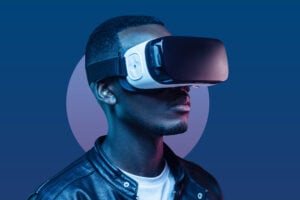Phygital Innovation: Balancing Personalization And Privacy Concerns And More
Phygitals that collect data about user behavior and preferences immediately trigger privacy concerns.

(Image by Getty)
“No! No more weird Web3 words,” my friend begged in response to my mentioning “phygital.”
The word phygital fuses “physical” and “digital” into one and refers to products, services, and experiences that blend the two worlds.

Early Adopters Of Legal AI Gaining Competitive Edge In Marketplace
Ready or not, phygitals are quickly gaining traction as an exciting next-gen evolution of the digital and physical worlds. And, of course, they bring potential legal concerns that lawyers and businesses must consider.
How Do Phygitals Work?
Phygital is a relatively new name for combining the physical and digital worlds to create a seamless, integrated experience. Phygitals use virtual reality (VR), augmented reality (AR), and AI to enhance physical experiences. And they use physical elements to enhance digital experiences.
For example, the Nike Fit app uses augmented reality to scan users’ feet and recommend the best shoe size. The Amazon Go store uses sensors and cameras to track customers’ purchases and charge them automatically as they leave the store.
Sponsored

The Business Case For AI At Your Law Firm


Early Adopters Of Legal AI Gaining Competitive Edge In Marketplace

Legal AI: 3 Steps Law Firms Should Take Now

Legal AI: 3 Steps Law Firms Should Take Now
Stores might allow customers to try on clothes virtually or provide product information through interactive displays. McDonald’s self-order kiosks are phygitals, as are QR codes and one-to-one online video calls, chats, and product tours with salespeople and real estate agents.
Phygitals can provide a more personalized customer experience, increase engagement and interactivity, and create new revenue streams for businesses. They’re great for helping companies offer experiences tailored to an individual’s preferences and behaviors. For example, a store may use facial recognition technology to identify returning customers and provide personalized product recommendations based on their prior purchases.
Manufacturers and corporations can use phygitals to optimize production processes and improve efficiency. Machine sensors can collect performance data and analyze areas for improvement. Sensors can track a product’s location and condition as it moves through the supply chain. Companies can enhance training by using VR to simulate real-world scenarios. The possibilities are endless.
What Are The Legal Concerns With Phygitals?
Phygitals that collect data about user behavior and preferences immediately trigger privacy concerns. Businesses must ensure they collect data in compliance with applicable laws and regulations such as GDPR or CCPA. This includes not storing personal data in public clouds and not transmitting personal data to third parties without user consent.
Sponsored

Is The Future Of Law Distributed? Lessons From The Tech Adoption Curve

Navigating Financial Success by Avoiding Common Pitfalls and Maximizing Firm Performance
Accessibility can be an issue. Not all users have access to the technology required for phygital experiences, limiting their ability to participate fully. This could create issues around discrimination or exclusion if not addressed.
Liability issues may arise if someone is injured or harmed during a phygital experience. If a user trips over an obstacle using an augmented reality headset in a store, the business may be liable for injuries.
Intellectual property rights are also a concern, as they often can be with digital products. Companies must be careful that a phygital experience doesn’t use copyrighted material without permission. And it’s not yet clear how to protect intellectual property while allowing users to remix or create new content for phygital experiences.
Take Steps To Mitigate Phygital Risks
Steps to mitigate these risks include:
- Implement robust data privacy policies and practices
- Ensure all technology is monitored, secure, and up-to-date
- Consider whether data lakes are appropriate for your organization
- Obtain proper permissions or licenses for copyrighted material
- Work to improve accessibility for all users
- Provide clear warnings or instructions to users regarding any potential hazards of participating in a phygital experience.
Phygitals are rapidly becoming part of the retail and marketing lexicon. Lawyers must ensure their clients use phygitals safely and responsibly as they become a significant part of the legal lexicon in the years to come.

Olga V. Mack is the VP at LexisNexis and CEO of Parley Pro, a next-generation contract management company that has pioneered online negotiation technology. Olga embraces legal innovation and had dedicated her career to improving and shaping the future of law. She is convinced that the legal profession will emerge even stronger, more resilient, and more inclusive than before by embracing technology. Olga is also an award-winning general counsel, operations professional, startup advisor, public speaker, adjunct professor, and entrepreneur. She founded the Women Serve on Boards movement that advocates for women to participate on corporate boards of Fortune 500 companies. She authored Get on Board: Earning Your Ticket to a Corporate Board Seat, Fundamentals of Smart Contract Security, and Blockchain Value: Transforming Business Models, Society, and Communities. She is working on Visual IQ for Lawyers, her next book (ABA 2023). You can follow Olga on Twitter @olgavmack.








